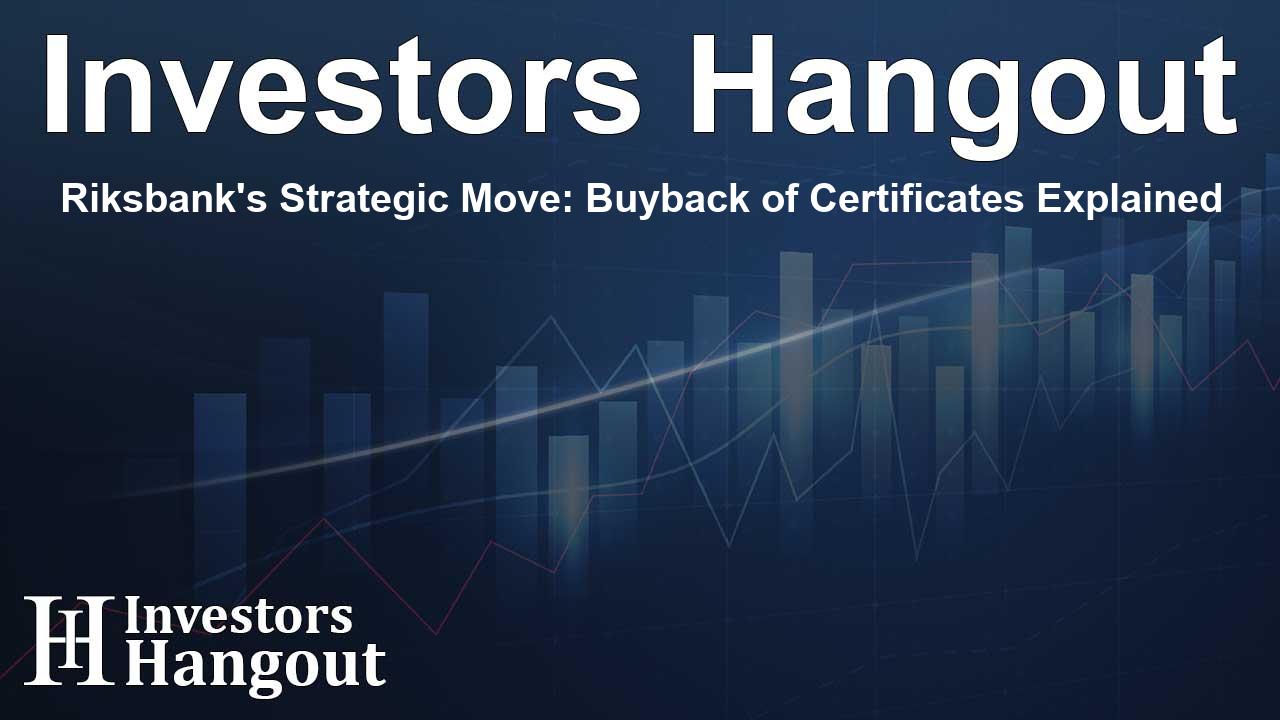Riksbank's Strategic Move: Buyback of Certificates Explained

Understanding the Buyback of Riksbank Certificates
The recent buyback of Riksbank certificates represents a significant event in the financial landscape. The Riksbank, Sweden's central bank, has engaged in this strategic financial maneuver to influence monetary policy and stabilize economic factors. This act of repurchasing certificates demonstrates the ongoing efforts to manage interest rates and promote liquidity in the market.
Key Characteristics of the Buyback
Certificate Maturity and Fixed Rate
One important aspect of this buyback is the certificate maturity. The certificates in question had a maturity date that aligns with specific economic forecasts and objectives. Additionally, the certificates bore a fixed rate of 2.10%, which includes a margin over the steering rate. This fixed rate structure is designed to provide stability and predictability for investors while navigating the ever-changing financial environment.
Volume and Trade Details
During this operation, the Riksbank successfully bought back certificates amounting to a staggering 25.0 billion. This substantial volume not only shows confidence in their monetary policy direction but also aims to provide a robust framework for the Swedish economy. The buyback occurred on a specified trade day, with an immediate settlement day, reflecting quick execution of their market strategies.
The Implications of the Buyback
The implications of such a buyback are multifaceted. By repurchasing certificates, the Riksbank aims to control inflation rates and influence the overall interest rate environment. These actions send strong signals to markets and can play a crucial role in maintaining economic stability. Furthermore, this decision can impact various sectors within the economy, from banking to investment landscapes, leading to potential shifts in how capital is allocated.
Conclusion and Future Outlook
In conclusion, the Riksbank’s recent buyback of certificates reflects a calculated approach towards monetary control and economic stabilization. As stakeholders analyze the outcomes of this operation, it will be interesting to observe how it shapes future financial strategies and market behaviors. Investors should remain vigilant about the influences of central bank policies like this, especially in the context of broader economic trends.
Frequently Asked Questions
What is a buyback of certificates?
A buyback of certificates is when a financial institution, such as a central bank, repurchases its own financial instruments to regulate market conditions, such as interest rates and liquidity.
What were the rates of the Riksbank certificates?
The fixed rate for the Riksbank certificates during the recent buyback was set at 2.10%.
How does a buyback affect the economy?
A buyback can influence interest rates, control inflation, and stabilize the financial market by adjusting the supply of financial instruments available to investors.
Why is the Riksbank conducting buybacks?
The Riksbank conducts buybacks as a strategic measure to manage monetary policy effectively and respond to economic fluctuations.
What impacts can be expected from this buyback?
Impacts include potential changes in inflation rates, adjustments in borrowing costs, and broader implications for investment strategies across various sectors of the economy.
About The Author
Contact Lucas Young privately here. Or send an email with ATTN: Lucas Young as the subject to contact@investorshangout.com.
About Investors Hangout
Investors Hangout is a leading online stock forum for financial discussion and learning, offering a wide range of free tools and resources. It draws in traders of all levels, who exchange market knowledge, investigate trading tactics, and keep an eye on industry developments in real time. Featuring financial articles, stock message boards, quotes, charts, company profiles, and live news updates. Through cooperative learning and a wealth of informational resources, it helps users from novices creating their first portfolios to experts honing their techniques. Join Investors Hangout today: https://investorshangout.com/
The content of this article is based on factual, publicly available information and does not represent legal, financial, or investment advice. Investors Hangout does not offer financial advice, and the author is not a licensed financial advisor. Consult a qualified advisor before making any financial or investment decisions based on this article. This article should not be considered advice to purchase, sell, or hold any securities or other investments. If any of the material provided here is inaccurate, please contact us for corrections.
